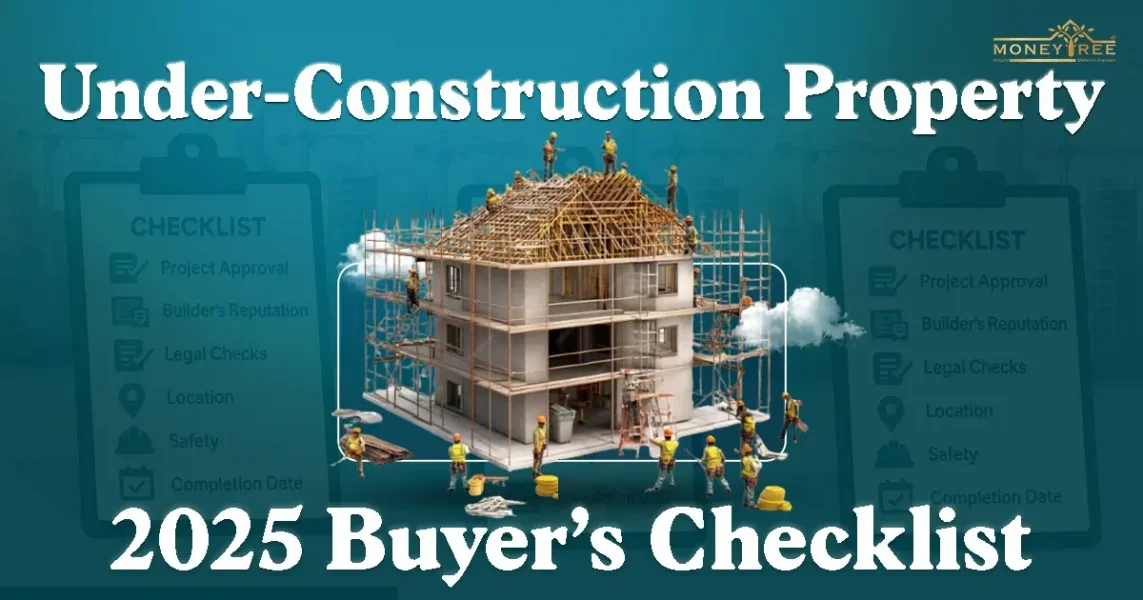Table of Contents
Real estate investment has always been a tricky endeavor, full of legal pitfalls and contractual fallacies. This problem often becomes more prominent when choosing an under-construction project. Hence, investors generally make an under-construction property checklist before making any decisions.
Why is a proper investigation before investing in under-construction projects necessary in 2025?
There are numerous risks associated with investing in under-construction projects that might lead to financial loss. Risks include construction delays, funding problems, and regulatory non-compliance. But all these scenarios can easily be avoided with a thorough investigation or even a quick background check of the builder. Thus, in 2025, it has become essential to make an under-construction property checklist for making any form of investment.
Under-construction property checklist: Things to check before property investment
Here are the 5 most important things to check before investing in under-construction projects:
Verify RERA registrations
RERA registration is the most prominent mark of quality projects. It ensures transparency and legal compliance in the real estate sector. Hence, RERA approved projects are always in high demand. But it is extremely crucial to ensure the authenticity of RERA registrations to avoid any future conflict. Most experienced investors prefer to assess all RERA documents and cross-check the details with the official RERA portal before making any deals.
Check builders track-record
Builder reputation is yet another key indicator of property quality. A renowned builder with a strong portfolio of projects is less likely to contribute to the risks of under-construction property. To maintain their social status, most established real estate companies would try to avoid construction delays or forge incomplete or faulty documentation. Client trust is their utmost priority, and that ultimately ensures the creation of high-quality projects. Thus, before investing in any under-construction property, it is best to always check the builder's track record.
Assess the payment plan
A proper payment plan is essential for the long-term profitability of real estate. To reduce financial risks, investors often choose payment strategies like a Construction-linked payment plan, a Down payment plan, a Time-linked plan, and even a Flexible plan combining all.
A construction-linked plan is closely related to construction milestones like the completion of a floor, internal designs, and so on. A down-payment plan, on the other hand, divides the payment into two parts, 10-15% at the time of booking and the rest within a short time (45-60 days). The time-linked plan has a fixed schedule of payment done in installments.
It is ideal to choose a plan that suits your investment needs to avoid any future financial hurdles.
Understand the locational advantages
The location of under-construction projects is strongly linked to their current and future values. Thus, it is important to choose a property after carefully evaluating all its local advantages. Before investing in under-construction projects, carefully check their infrastructural foundation, future growth prospects, and connectivity. All these factors have a huge influence on the future profitability of the project.
Assess construction quality
Construction quality is the single most important factor in determining the safety and durability of a project. Hence, it should be one of the top priorities in your under-construction property checklist. This involves inspecting construction materials and on-site practices. Investors can even assess the foundation design to ensure that the property can withstand any local calamities. But first-time investors may get confused as to which materials can be considered good. These new buyers should consider consulting a professional before making any purchase.
Check Legal documents for property purchase
Checking legal documents related to the property is a smart way of protecting oneself from future financial hurdles. The most essential documentation to look for is the Title Deed, which legally shows the seller's ownership over the land, the Sale Agreement, which has the terms and conditions of the sale, and the Commencement Certificate, which certifies that construction began after all necessary approvals. For RERA approved projects, it is important to check the RERA registration certificate as well.
Those who are unsure about the validity of any document provided by the seller can consult a property lawyer and legal expert before making any investment decision.

Real estate investment guide: Property buying tips India
The Indian real estate market is growing at an exponential rate, making smart investment even more difficult. With a large variety of property to choose from, it is easy to overlook important details before making an investment decision. So here are top four property buying tips India that can help make smarter moves:
Hire a real-estate consultant
Most new buyers are unaware of the various risks and pitfalls related to real estate properties. Even experienced investors often fall victim to hasty decisions and make financial blunders. Thus it is always important to consult a professional in the industry before purchasing any real estate. Professional consultants can offer data-backed investment plans that can ensure long term profitability. They can even help cross-check all the legal documents and ensure smoother price negotiations.
MoneyTree Realty has years of experience in this domain. They are currently one of the most trusted real estate consultants offering well-researched property advice that is easy to implement.
Ensure all documents are in order
One of the key steps of investing in under-construction projects is verifying its legal documents. Make sure to check the Sales deed, Title deed and RERA registration certificate. This reduces the risk of future disputes and ensures a secure transaction. This step protects the buyer from fraudulent deals and helps them make smarter investment choices.
Ensure regular site visits
Regular site visits can help investors have better knowledge about the construction progress. Buyers can check for delays and effectively assess the construction quality. During on-site visits, investors can confirm whether the promised amenities are being delivered and verify the infrastructural condition of the neighbourhood. All these help the buyers protect their investment.
Decide on an effective payment plan
Before signing a deal make sure a proper payment plan is in place. There are multiple payment options available for investing in under-construction projects so ensure you have picked the correct one that suits your needs. The most common plans chosen are the Construction-linked payment plan, a Down payment plan, and Time-linked plan. Each of these cater to specific investment plans and even a combination of such plans can be ideal for some investors.
Bottom Line: Take precautions before investing
The 2025 real-estate market for under-construction projects is a promising investment field but profiting from it can be complex. There are numerous financial loopholes and contractual pitfalls investors need to be careful about. It is best to consult a professional before making an investment. As the saying goes, "Prevention is better than cure".
Frequently Asked Questions







